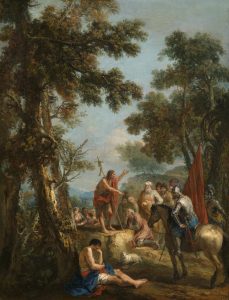Thoughts on Sunday’s Lessons for Dec. 15, 2024

Saint John the Baptist Preaching (c.1735-1745), oil painting on canvas by Francesco Zuccarelli (1702-1788). Kelvingrove Art Gallery and Museum, Glasgow, Scotland. (Click image to enlarge.)]
First Reading: Zephaniah 3:14-20
This week we light the pink candle on the Advent wreath for the Third Sunday of Advent, traditionally called Gaudete (“Rejoice”) Sunday or Rose Sunday. A common thread in the day’s Lectionary readings calls us to be joyful even in times of stress. The minor prophet Zephaniah warned that Jerusalem would be destroyed because its people had turned away from God. But then, in this passage from the third and final chapter of this short book, the prophet’s thoughts turn to hope: After an exile, a joyous time will follow, when God will gather Israel’s righteous people, restore their fortunes, and bring them home.
Psalm: Canticle 9 (Isaiah 12:2-6)
Even in modern times, a seasonal drought is a serious threat to crops, farmers, consumers, and even a nation’s economy. In biblical times, drought was even worse: A failed crop could mean life or death. Isaiah, the major prophet who foretold Israel’s destruction, exile, and return surely knew that water is one of the most important things that God gives us. This Canticle, drawn from the first portion of Isaiah before the exile, called on the people to thank God with joy whenever they draw precious, life-giving water from the springs of salvation.
Second Reading: Philippians 4:4-7
Last Sunday, in the opening verses of Philippians, we heard Paul express his love. Now, near the end of this affectionate letter from prison in Rome to the people of this little church in Northeastern Greece that he had founded years before, he urges them to be gentle and kind: Rejoice in God’s love and trust in God’s mercy and peace. Paul’s words to them, “The peace of God, which surpasses all understanding,” have become a familiar blessing through the ages.
Gospel: Luke 3:7-18
At first glance, it’s not easy to find the joy in this Gospel portion, which concludes Luke’s account of John the Baptist in the desert that we began last week. Luke shows us a long-haired, ranting prophet, yelling at the crowds who came to be baptized by him, declaring them “a brood of vipers.” John is no Messiah, he tells them. But he shouts that one more powerful than he will soon come to baptize with the Holy Spirit, separating the good wheat from the unworthy chaff. Get ready, John demands. Share your clothing and food with those who have none. Don’t cheat. Don’t be selfish! These are the themes that we’ll hear repeatedly in Luke’s Gospel this Lectionary year. Jesus too will proclaim them as he spreads the Good News, the joy.
